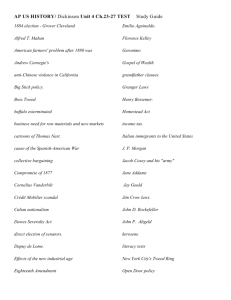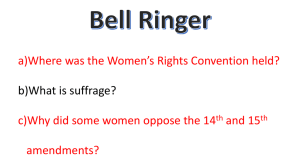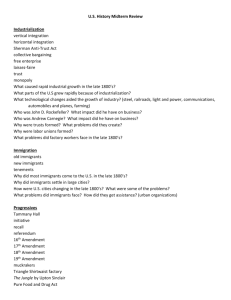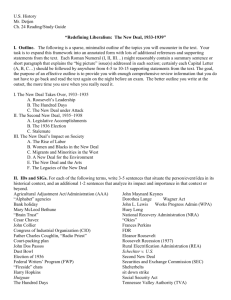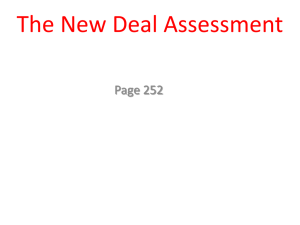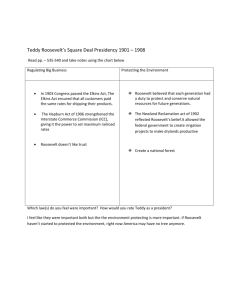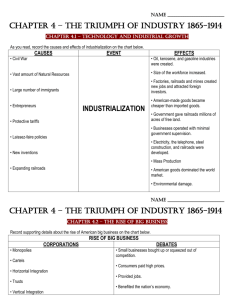Section 1: Theodore Roosevelt and the Modern Presidency
advertisement
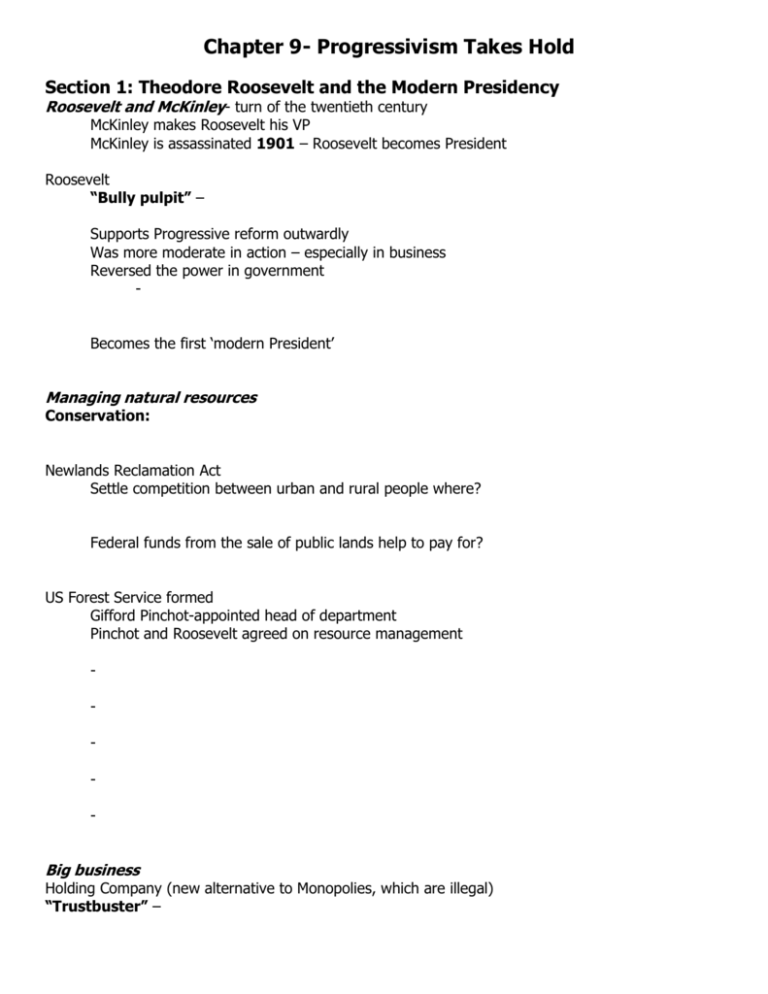
Chapter 9- Progressivism Takes Hold Section 1: Theodore Roosevelt and the Modern Presidency Roosevelt and McKinley- turn of the twentieth century McKinley makes Roosevelt his VP McKinley is assassinated 1901 – Roosevelt becomes President Roosevelt “Bully pulpit” – Supports Progressive reform outwardly Was more moderate in action – especially in business Reversed the power in government Becomes the first ‘modern President’ Managing natural resources Conservation: Newlands Reclamation Act Settle competition between urban and rural people where? Federal funds from the sale of public lands help to pay for? US Forest Service formed Gifford Pinchot-appointed head of department Pinchot and Roosevelt agreed on resource management - Big business Holding Company (new alternative to Monopolies, which are illegal) “Trustbuster” – Mines: 1902- miners on strike for better wages/conditions/etc -they get higher wages and a shorter day, but lost their union recognition (owners against it) -owners then raise coal prices to cover higher wages paid to workers -Roosevelt tells public they got a “________________________” -slogan for next presidential campaign 1906 – Meat Inspection Law and Pure Food and Drug Act William Howard Taft Roosevelt’s successor in 1908 Prosecuted twice as many trusts/holding companies as Roosevelt Expanded National Forest Established the Children’s Bureau-protect rights of children Chapter 9 Section 2 Reading Guide Questions: How was Wilson brought up? What disadvantage did he overcome? What was the ‘best model of government’ according to Wilson? Why? How were senators chosen before the 17th amendment? What were his accomplishments as governor? 1912 election: there were 4 candidates for president. Fill out the following chart: Candidate Party Party platform/goals Who were the front runners in the election of 1912? What did they have in common? What did they disagree on? Describe Roosevelt’s New Nationalism. Describe Wilson’s New Freedom Who wins the election of 1912? Why did Wilson present a bill to congress that would reduce tariffs? What is this bill called when it gets passed? How would the Federal Reserve System benefit the bank, people and economy? Describe the Clayton Antitrust Act. Describe the Federal Trade Commission and the reasoning behind creating it. How did Wilson try to/and help workers? Who are ‘common citizens’? Who benefited during the progressive era? Who did not? Section 3: Limits to Progressivism African Americans and Equality Poverty and Discrimination 2/3 of African Americans live in the South- _________________________________________ In North- still experience prejudice, segregation and job competition with new immigrants Jim Crow Laws- ____________________________________________________ Plessy v. Ferguson -_____________________________________________________ Different responses to situation: Booker T. Washington W.E.B. Du Bois (co-founder of NAACP) - Whites were less directly threatened by Washington -found far more favor among sympathetic whites -was funding court cases against Jim Crow laws -also helping with anti-lynching campaigns Immigrants and the melting pot Immigrants struggled to find their place in American society Progressives do not seem to value the cultural diversity brought to America by immigrants -in fact they see them as __________________________________ -Americanize the immigrants before they dilute the American culture Negative response to immigration Nativism: Scientific evidence?? of racial inferiority – some support the idea of eugenics Immigration restrictions 1880-__________________________________________________ 1907-“gentlemen’s agreement”: ____________________________ 1917-refused entry to immigrants over 16 who were ________________ Immigrants relied on each other for support and assistance Workers and Radicals Labor Unions-progressives understand the plight of the worker but scared of radical labor leaders who opposed capitalism Progressives agree with shorter days, minimum wage for women and prohibition of child labor -do not agree with _______________________________________ Without unions, union leaders feared that the government reforms in business could be repealed whenever -______________________________________________________ Socialists Distrust government the most Socialists blame _____________________________ for the problems faced by workers Progressives believed laws would solve the problems but socialists believed that __________________________ would solve them International Workers of the World (IWW) Radical labor organization-went further then the socialists Instead of running a candidate for office and fixing issues from the inside with the progressives, they believed in ______________________________________________________
